Institutional Context
Summary
The London School of Economics and Political Science was established in 1895 as “a community of people and ideas, founded to know the causes of things, for the betterment of society”. We continue to pursue this founding vision through our delivery of high-quality research, teaching, and knowledge exchange underpinned by distinctive social science expertise.
Based in Westminster, central London, the School’s community is diverse and international, and we take pride in the global use of our research. LSE has traditionally strong connections with the major legal, financial, cultural, and political institutions surrounding it. Through LSE 2030 we are committed to broadening and deepening our societal impact, connecting interests through issue-oriented research, making evidence-based interventions, and promoting engagement with wider society.
Institutional context
LSE is a specialist social science and humanities (SSH) institution. Research and teaching span the breadth of SSH disciplines, with activity structured across 25 departments, four interdisciplinary institutes, and 20 research centres. We employ 4,090 staff and have 11,566 students from 148 countries. Our annual research income is £57 million. (All figures from 2021/22.) LSE is the top university in the UK based on the proportion of “world-leading” research produced (REF 2021) and was ranked 2nd in Europe and 3rd in the world in the social sciences in the 2023 QS World University Rankings.
Knowledge exchange is central to our founding vision. The School is committed to mobilising social sciences research for public good; to inform public policy and economic decision-making, enhance social welfare, foster innovation, and convene creative intellectual debate and public engagement.
LSE’s central London location and international community and outlook are fundamental to our identity. We leverage our location in the heart of London to facilitate mutually beneficial engagements between staff and students and the major neighbouring government, financial, legal, and political institutions, as well as with our local communities and businesses. The LSE community is diverse, with 66% of students coming from overseas and 219,000 alumni in over 200 countries. We are equally proud of the far-reaching international impacts and the more localised, civic contributions arising from our outstanding research, education, and knowledge exchange.
Knowledge exchange activities undertaken by LSE staff and students are characterised by their basis in excellent social science research with diverse local, national, and international contexts and beneficiaries. Activities range from formal engagements delivered through central support services (e.g. commissioned or contracted work facilitated by LSE Consulting), through new research innovations developed in collaboration with the private sector or social enterprises (e.g. Aspect, LSE Generate), to more targeted public engagement initiatives run at School, departmental, or research centre levels (e.g. LSE Festival). Central coordination and support and opportunities for funding are provided by the Knowledge Exchange and Impact Integrated Service.
LSE 2030 sets out our ambition to demonstrate the value of the SHAPE disciplines by helping to shape the world’s political, economic, and social future. To that end, the School will support continued improvements in the quality and efficacy of its knowledge exchange and strive to maximise its reach and significance beyond academia. We have well-established strengths in UK and international public policy, but our research also frequently underpins humanitarian, development, health, legal, environmental, and social justice impacts, as well as finding applications in private sector organisations, in efforts to promote financial growth and stability, and in work to tackle climate change. Over the coming years, knowledge exchange at LSE will both build on our traditional strengths and cultivate new relationships, particularly with the private sector. And we will achieve this while promoting diversity and inclusion by involving the broadest appropriate cross-section of the staff, students, alumni, and partners who make up our valued LSE community.
For further information, please send queries to Research.Kei@lse.ac.uk
Local Growth and Regeneration
Summary of approach
Aspect 1: Strategy
LSE 2030 sets out our ambition to demonstrate the value of the SHAPE disciplines by helping to shape the political, economic, and social future of London and beyond. Our contributions to the city's growth, development, and prosperity come from engaging directly with partners in local government, businesses, and other civic groups across all boroughs. LSE’s strategic commitment to London is informed and supported by feedback provided by staff, students, alumni, and partners during the comprehensive consultation conducted prior to the LSE 2030 launch.
Our approach can be described under three broad headings:
LSE Leading for London
Through the LSE Leading for London initiative, we convene discussions with stakeholders from business, local and central government, and community groups on policies to improve opportunities and outcomes for Londoners. Impacts of our research projects are maximised through investment in links with the Greater London Authority, London Boroughs and Councils, and the London Metropolitan Police. LSE maintains strong relationships with the civil service; engages widely with policymakers and planners, notably within Westminster City Council and City Hall; and targets strategic networking events such as party conferences and The London Conference.
Understanding “what works” to promote local growth through effective public policy
We invest in research expertise in areas including crime, housing, city planning, and long-term care to support the development of evidence-based policy promoting growth in London. This research is concentrated particularly in the Centre for Economic Performance, LSE London, LSE Cities, LSE Housing and Communities, and the Care Policy and Evaluation Centre. Much of it is commissioned by and/or jointly conducted with civil society and policy groups, and co-production of research with policymakers and practitioners is an important part of our approach. LSE researchers work closely with end-users including local authority institutions (e.g. GLA), professional and public-sector organisations (e.g. the London Metropolitan Police), think tanks (e.g. Centre for London), and London residents.
LSE’s What Works Centre for Local Economic Growth, jointly hosted with the Centre for Cities, aims to make local growth policy more cost-effective by improving the use of evidence in policy, enabling better impact evaluation, and summarising what works using robust evidence. Its work is enhanced by close links with policymakers working on local economic growth.
Investing in skills supporting enterprise, innovation, and entrepreneurship in London
LSE has made significant investments in developing entrepreneurial skills in staff, students, and alumni who contribute to local businesses, start-ups, and social enterprises in London; e.g. through key functions and initiatives such as LSE Generate and LSE Innovation, and our leadership role in Aspect (A SHAPE Platform for Entrepreneurship, Commercialisation and Transformation).
LSE supports skills development through the Data Science Institute, executive education programmes, Digital Skills Lab, and diverse non-academic placements facilitated by our PhD Academy, LSE SPRING, or Public Research Partners programme.
Our Widening Participation programme also works with London schools to extend opportunities to children from underrepresented backgrounds, support their progress to higher education, and provide insights into professional careers in fields such as banking and finance and law.
Aspect 2: Activity
LSE Leading for London
The impacts of activities described here are leveraged by LSE’s established links to London’s government and public-sector stakeholders. As the figurehead of LSE Leading for London, Professor Tony Travers provides leadership and enhances connectivity with those working to address the city’s challenges. Prof Travers is a member of both the London Recovery Board, chaired by the Mayor and Chair of London Councils, and Westminster City Council's Future of Westminster Commission, and co-chairs the London Research and Policy Partnership, a joint initiative between the GLA and University of London which fosters effective research and policy links. London-relevant work by Prof Travers and a wider team of LSE academics is coordinated and disseminated across local boroughs and key networks (e.g. BusinessLDN, London Higher, the London APPG), and informs discussions at policy-focused events for London communities.
LSE Cities led work with the boroughs of Lambeth and Southwark examining potential futures or “scenarios” for policy advice and decision-making in the face of rapidly changing and uncertain events (e.g. Covid-19, Brexit).
Understanding “what works” for public policy
LSE research has supported the development of evidence-based policy promoting growth in London, particularly in the areas of crime, housing, city planning, and long-term care. Many projects were directly funded by internal, competitive bid funds, with all supported by the KEI Integrated Service. Prominent examples from LSE research centres and departments include:
Centre for Economic Performance
The Centre for Economic Performance maintains a strong, research-based relationship with the London Metropolitan Police’s strategic insight unit. Research on domestic abuse during Covid-19 lockdowns underpinned continuous advice on changing patterns of abuse, with the CEP team delivering weekly updates and mapping data which informed real-time police responses. CEP work on burglaries in London challenged current policing tactics. Findings of a study of the socioeconomic determinants of street gangs operating in London drove discussions at a June 2022 invitation-only, high-level roundtable focused on the political and practical challenges of tackling crime.
Professor Tom Kirchmaier and Professor Stephen Machin met with Police and Crime Commissioners, London councillors, and the Mayor's Office for Police and Crime to discuss CEP research on “balanced policing”, showing how certain areas are not policed fairly and in line with existing demand levels, challenging the democratic principles underpinning policing. Prof Kirchmaier also provided advice on using empirical evidence more effectively in policing through his role on the Home Office Scientific Advisory Committee.
LSE London
LSE London has participated in major debates about the economic and social issues faced by Londoners, providing data and analysis used by decision-makers across the city. This includes an investigation of how residents experience living in high-density housing, research to understand the housing aspirations of the young Londoners who underpin the city’s economy, and a rapid evidence review of support for homeless non-UK nationals without access to public funds during Covid-19. LSE London played an active role in the formal Examination in Public of the Mayor’s London Plan, submitting written evidence, convening roundtables, and participating in public evidence sessions.
LSE Cities
Seen and Heard gives young people a voice in the design and management of local public spaces. Commissioned by Brent London Borough of Culture, the project challenged how young people were often treated more as a security risk than as equal stakeholders and empowered them to create positive change in their communities. Workshops led by architects, developers, artists, and youth workers facilitated discussion on what constitutes “good” public space for young people. Participants produced new designs for public spaces, policy recommendations, and the “Yellow Charter”, a statement demanding a greater role for young people in the planning and design of public spaces. These were presented to local and regional planning bodies, including the GLA.
Care Policy and Evaluation Centre
In collaboration with the London Association of Directors of Adult Social Care, CPEC worked with London councils to strengthen and support the London’s social care sector’s response to Covid-19. This involved daily analyses and modelling to target support for care providers and allocate scarce social care resources. CPEC and LondonADASS have since established a strategic partnership through which CPEC is shaping social care commissioning strategies and the development of quality standards, and building local capacity through “masterclasses” on topics such as care markets and care quality.
LSE Housing and Communities
Based within CASE, LSE Housing and Communities contributes to efforts to effectively respond to London’s housing crisis. Its work included evaluations of the London Borough of Newham’s 2019-2022 rough sleeping strategy and its Housing First pilot, and a 2020-2022 social benefit analysis of EastEndHomes’ neighbourhood management approach. Work has continued in the Royal Borough of Kensington and Chelsea in the years after the Grenfell Tower fire, including a social impact evaluation of the regeneration of the Lancaster West Estate. The goal is to make Lancaster West a "model estate for the 21st century", with impeccable environmental credentials, significant community involvement, and greater social inclusion.
Camden Household Air Monitoring Project
In partnership with Camden Council, a study led by Dr Sefi Roth of the Department of Geography and Environment observes the scale of indoor air pollution in Camden homes and examines possible strategies to reduce exposure and improve residents’ health and wellbeing. This is done by placing cutting-edge pollution monitoring devices inside 240 households, providing evidence of the need to afford indoor pollution the same policy attention as outdoor pollution. Camden Council has facilitated the involvement of participating households, each of which will receive a report detailing the pollution levels observed and recommendations on how to reduce them.
Configuring Light
The Department of Sociology’s Configuring Light project, designed and run with municipalities, developers, and design practitioners, explores how lighting reinforces inequalities within cities. Part of the Southwark Council Great Estates Programme, Configuring Light conducted participatory community research to produce a pilot lighting installation in the Brandon Estate, informed by social understandings of the relationship between crime, safety, and light in public space.
What Works Centre for Local Economic Growth
Since 2019, the WWLEG has attracted £3.9m of funding to support interventions to make local growth policy more cost-effective through better use of evidence and evaluation. Funders include the Department for Business, Energy and Industrial Strategy, the Department for Levelling Up, Housing and Communities, and the Department for Transport. Notable projects include an evaluation of social landlord interventions in London; analysis of integrated ticketing systems, (e.g. London's Oyster Card); and work on rail investment, high street regeneration, and green investments.
Investing in skills supporting enterprise, innovation, and entrepreneurship in London
LSE Generate works with social enterprises and community partners to help Londoners understand how to establish a business and the skillsets and mindsets required to be successful. Examples of London-based start-ups supported by Generate include Here We Flo, which provides organic products for menstrual care, and Kinhub (formerly Kami), a health and wellbeing platform offering guidance and support to working parents and their employers. Local entrepreneurs also participate in Generate's innovative “Mentorpreneurship” programme, which engages past, current, and future student entrepreneurs in a mentoring "lifecycle".
LSE Innovation aims to maximise the benefits of LSE research by helping academics turn their research ideas into new businesses, products, or services to tackle London's biggest challenges. Notable projects include the Transition Pathway Initiative, which has worked with London Stock Exchange and FTSE on an index used by investors to judge publicly listed companies’ climate change performance; Care Quality Evaluation, assessment tools developed to track performance of clinical programmes but now extended to homelessness programmes in London; and Alexandria, which has developed smart contracts using a Blockchain platform, with pilot sponsors including the BBC.
LSE provides catalytic funding and expert support for research commercialisation and entrepreneurship in London through various accelerator programmes, including Aspect's ARC Accelerator (funded by a £3.9m ESRC Catalyst grant) for SHAPE academics; the Marshall Institute's 100x Impact Accelerator, providing catalytic capital (£150k) to the most promising social ventures; Generate’s annual accelerator for LSE students or alumni; and Zinc, the mission-based start-up generator and accelerator.
LSE further contributes to growth through research-based education programmes for professionals working on London-related issues. Our School of Public Policy offers an Executive Master of Public Administration and an Executive Master of Public Policy, to train future leaders of the UK Civil Service. The SPP has also organised capstone projects with London-based organisations including in the banking sector, public-sector healthcare providers, and regulatory organisations.
Finally, Widening Participation's Pathways to Law and Pathways to Banking and Finance programmes, run in collaboration with the Sutton Trust, offer London-based pupils insights into professional careers in these fields. These programmes provide academic taster sessions, mentoring, work experience placements, and access to Sutton Trust networks.
Aspect 3: Results
LSE impacts on local growth and regeneration are monitored centrally by the KEI Integrated Service. Departments and research centres each have a nominated KEI Coordinator tasked with monitoring the outcomes of London-based knowledge exchange activities (e.g. business and policy engagement) and feeding in to central reporting. This is supplemented by specialised, sector-specific evaluation capacity (e.g. WWLEG and CPEC) and a School-wide evaluation forum, which shares methods and frameworks representing institutional best practice.
The impacts of LSE research are promoted externally through Research for the World, which was awarded "Best Publication" at the CIPR Excellence Awards 2022. We also worked with London Higher to demonstrate our impact in London communities, contributing to the London Civic Map. Examples of the impacts of activities described above include:
LSE Leading for London
In 2022, LSE commissioned Savanta to poll our political stakeholders on LSE's civic reputation in the capital. LSE research is considered a valuable resource to policymakers and influencers in London, with our communications and events having cut-through among local MPs, councillors, civil servants, and businesses. The importance of academics such as Prof Travers in building visibility of the research was highlighted, ensuring LSE research carries credibility and is more influential on its audiences, and thereby also in its applications to policy.
Partners in Lambeth and Southwark have reported how the "scenarios" developed by LSE helped leaders to conceptualise policy change in a way that centres health equity, accounting for the social, spatial, and cultural contexts that should guide policymaking.
Seen and Heard
This project was cited in the Mayor of London’s Public London Charter as an example of how rules for public spaces should be developed through consultation and community engagement. This charter is used by planning authorities assessing applications for proposed public space and so means new developments must now consider young people’s needs and consult meaningfully with locals in the design and delivery of new public spaces.
A legacy project saw Samovar Space, a new public space designed by and for young people, open officially last year.
Housing and Communities
The 2019-2022 evaluation of the London Borough of Newham's rough sleeping strategy led to a fundamental shift in how rough sleeping was tackled locally. After delivering findings and recommendations to Newham Council following the evaluation of its Housing First pilot project, the programme was expanded and rolled into the borough’s Integrated Rough Sleeper Support Service.
Configuring Light
The Brandon Estate pilot lighting installation was adopted permanently by Southwark Council. In an LSE-produced film documenting this project, Brandon residents and a Southwark Council Great Estates Programme representative describe the impact of the new installation, its safety benefits, and the convivial atmosphere it has engendered.
What Works Centre for Local Economic Growth
The WWLEG has published evidence reviews, briefings, and toolkits which have enabled decision-makers to improve the use of evidence in policy and enable better evaluations of the impact of those policies on local growth. It has supported and funded evaluations and delivered training for people developing policy, bidding for funds, or delivering projects.
LSE Generate
Since 2019, Generate has supported the establishment of more than 300 start-ups - 34 of which came through the annual accelerator – employing more than 600 staff. Here We Flo was named the £1m Grand Prix Winner of the Sky Zero Footprint Fund in 2021. The impact of Generate was also recognised when LSE was named Outstanding Entrepreneurial University at the Times Higher Education Awards last year.
Public & Community Engagement
Summary of approach
LSE began as “a community of people and ideas, founded to know the causes of things, for the betterment of society”. Continuing to engage with our people and communities - in partnership, collaboration, and dialogue - remains vital to realising that founding vision. This means sharing the insights of our world-class social sciences research and involving citizens in its development, harnessing our convening power to deliver an outstanding programme of public outreach and events, and encouraging our staff and students to play an active and engaged role in their communities and society. At a time of huge and complex changes, LSE draws on its distinguished and distinctive history to engage with the world and shape a better future.
Aspect 1: Strategy
A strategic priority of LSE 2030 is “Research for the world”; to “convene the world in and from London”. To that end, we leverage our global networks to engage citizens, thought leaders, and world leaders in influential debates on critical issues, demonstrating the value and impact of social science research. Participants include diverse communities, policymakers, businesses and civil society groups, entrepreneurs, and other research institutions. Discussions are enlivened and enriched by broader public involvement, including students and staff here and at other universities, our global alumni community, and our research partners (see Figure 1). Another LSE 2030 priority is “Develop LSE for everyone” and this message of diversity and inclusion was imperative to both the devising and delivery of our strategy.
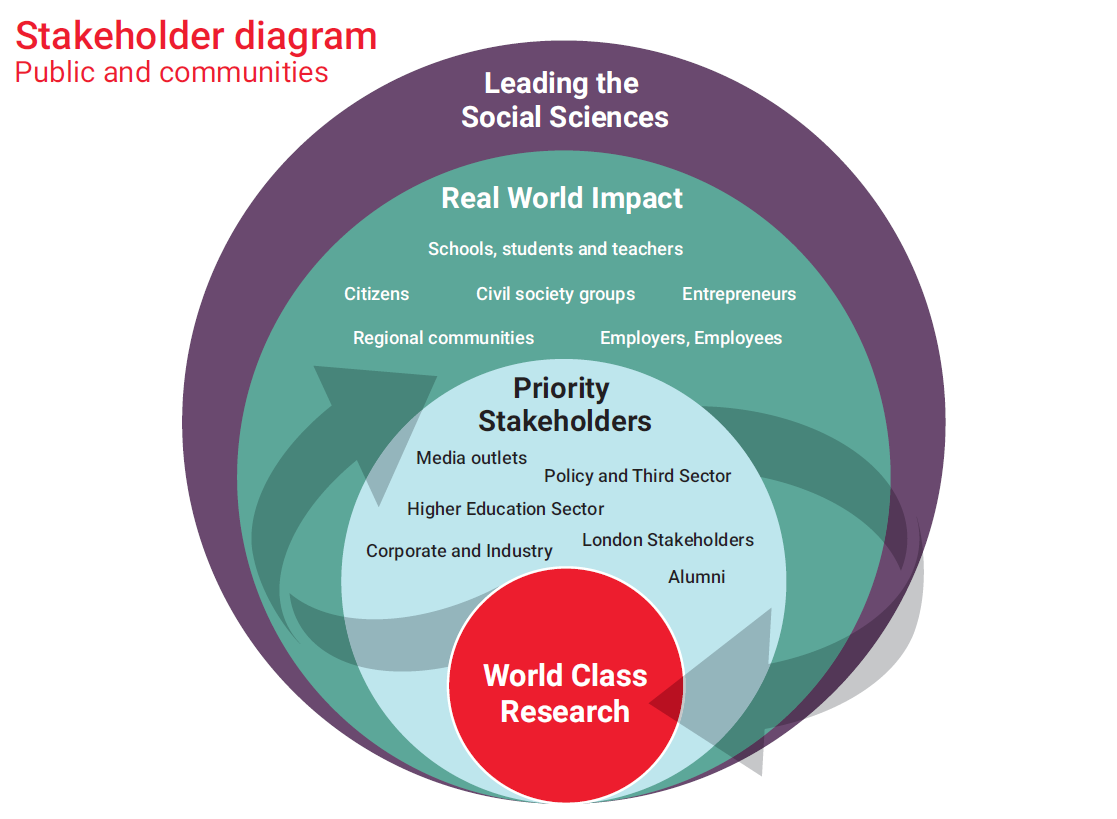
Figure : LSE public and community stakeholders.
Our approach to P&CE has three elements:
Research
We provide encouragement, incentives, support, and resources to our researchers to build engagement with relevant communities into research plans to address their particular needs or challenges. Understanding what these needs are and how LSE can help follows from building and investing in relationships with our communities, allied to robust analysis of available data.
Education
P&CE is embedded throughout our research-rich teaching programmes and the wider environment and opportunities available to LSE students. This includes high-quality placements facilitated by the Public Research Partners programme as part of undergraduate courses; LSE Generate supporting students to engage with the corporate sector and build a socially responsible business; and Widening Participation work with schools to extend opportunities to children from underrepresented backgrounds and address broader issues of equity, social inclusion, and mobility.
Public outreach
We engage our communities through our extensive programme of public events and digital resources. This includes the annual LSE Festival and our renowned public lecture programme, our wide-ranging social sciences LSE Blogs platform, considerable library of multimedia content, digital innovations such as The State of the States, and significant social media following.
Through these three elements we work towards our strategic goals of demonstrating the value of the social sciences and ultimately contributing to the betterment of society for our people and communities.
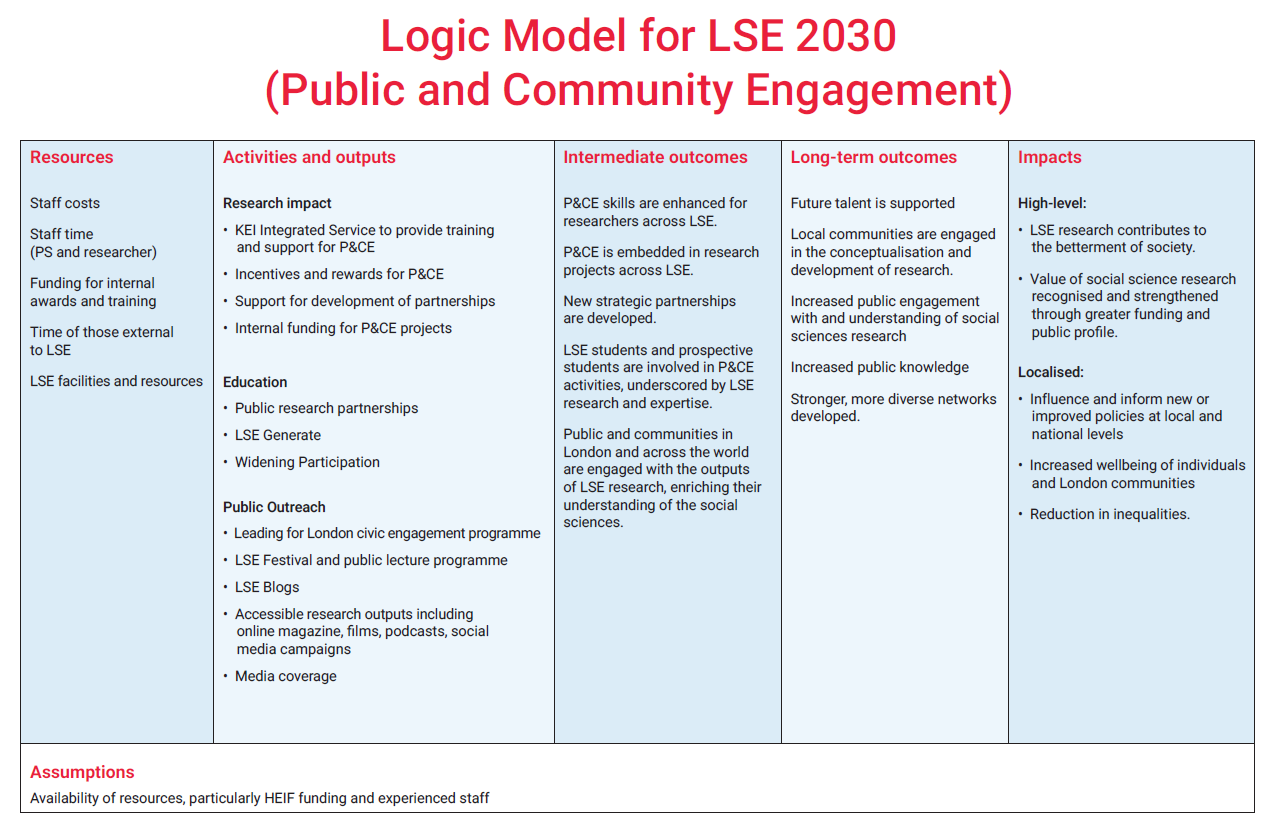
Figure 2: LSE’s public and community engagement strategy logic model.
P&CE is overseen by the Director of Communications, reporting to the Senior Management Team. The Vice President and Pro-Vice Chancellor (Research) chairs both the Knowledge Exchange Framework Strategy Committee (KEFSC) and Research Development Panel, responsible for taking strategic decisions and disbursing LSE's annual HEIF allocation respectively. A significant proportion (£10.47m since 2019) of HEIF is directed towards key functions supporting the P&CE strategy outlined above, with success monitored using a broad suite of KPIs (see Aspects 4 and 5).
LSE’s updated “Research for the World” strategy will be finalised in 2023. Specific P&CE-relevant workstreams supporting LSE’s continued impact and influence have been developed, with KPIs to be set in conjunction with community stakeholders. Significant additional resources (c.£1m p/a to 2027/28) have been allocated to support progress and delivery.
Finally, the benefits of our P&CE are enhanced and amplified by the incredible partnerships, networks, and initiatives in which we’re proud to participate, such as SHAPE, Aspect, and CIVICA.
Aspect 2: Support
Practical support is led by our KEI Integrated Service (see Figure 3). Researchers and students benefit from training, guidance, and advice from services across the Communications Division, Research and Innovation, LSE Library, and Philanthropy and Global Engagement.
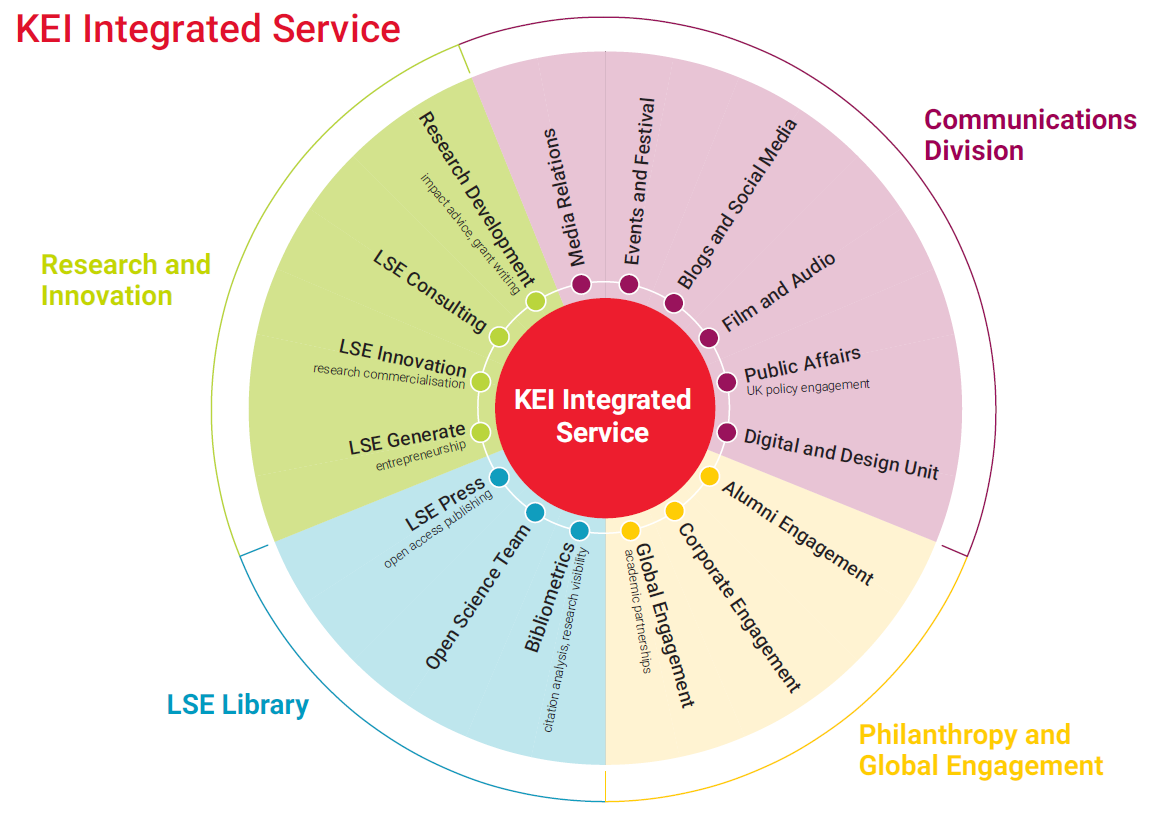
Figure 3: LSE KEI Integrated Service.
The KEI Integrated Service runs P&CE-related training through LSE’s RISe development programme, with 440 participants (in-person and online) throughout this KEF period. Additional “lunch and learn” sessions are held for researchers and support staff, with topics including policy engagement, broadcast media, and website design. During this period, 52,500 people have accessed the KEI Integrated Service’s online resources. Training, advice, and other peer support is also facilitated through LSE programmes and networks including LSE SPRING, Corporate Engagement Network, Early Career Researcher Network, and KEI Forum. External communities seeking opportunities to engage with our research and expertise can do so through dedicated contact points (e.g. the LSE Business Gateway, corporate engagement, LSE Consulting, “find an expert”), and through central public engagement opportunities such as the LSE Festival.
In addition to funding our significant support infrastructure (£10.47m), since 2019 LSE has provided £1.89m of further HEIF funding to support researchers’ KEI activities, including P&CE. This is awarded via the KEI Fund, a competitive fund inviting applications for up to £100k of project support. PhD students can apply for grants of up to £5k. P&CE activities are also funded via the Research and Impact Support Fund (up to £20k), while in 2020 £320k was provided to 23 projects with demonstrable policy engagement potential through the Covid-19 Rapid Response Fund. Twenty-three departments were each allocated £5-10k annually to seed-fund KEI activities, with a focus on P&CE. The KEI Integrated Service supports all funded projects.
P&CE is recognised in LSE’s criteria for both promotions and academics’ contribution pay, as well as through the School’s Excellence in Research awards and Spotlight Prizes. Our Policy Fellow career track provides an innovative career progression structure which specifically rewards policy-oriented engagement activities. Sixty academic staff are currently enrolled. The P&CE work of researchers is also celebrated at the annual LSE Festival and the Research Showcase series, in our bi-monthly Research for the World magazine, and on dedicated LSE web pages.
KEI strategy and operations are subject to regular equality impact assessments to promote inclusion, mitigate adverse effects, and ensure transparency.
Aspect 3: Activity
Notable examples of LSE's P&CE activity include:
Public outreach – demonstrating the value of the social sciences
LSE Festival and events
The annual LSE Festival features a series of imaginative, innovative activities - free and open to anyone - designed to stimulate thoughtful debate and engage a wide public audience with our research. From 2020 to 2022, 18,240 people attended more than 100 events during the week-long Festivals, including talks, debates, film screenings, interactive tours, research sprints for school students, and activities for primary-school children (see Figures 4-7). Festival event podcasts have been downloaded more than 825,000 times.
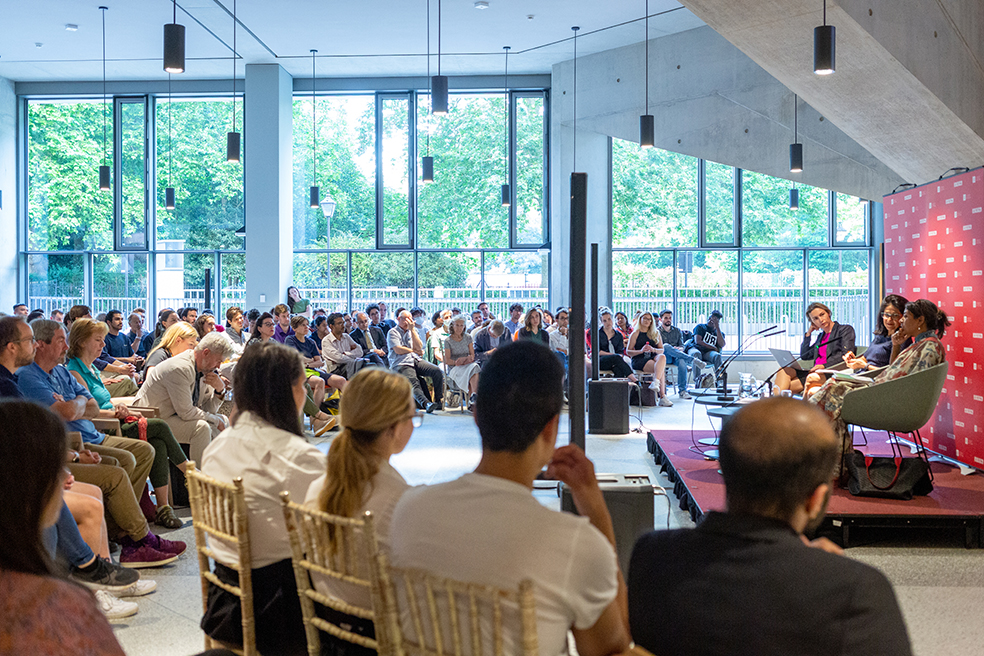
Figure 4: "Future of Democracy" event, LSE Festival 2022.
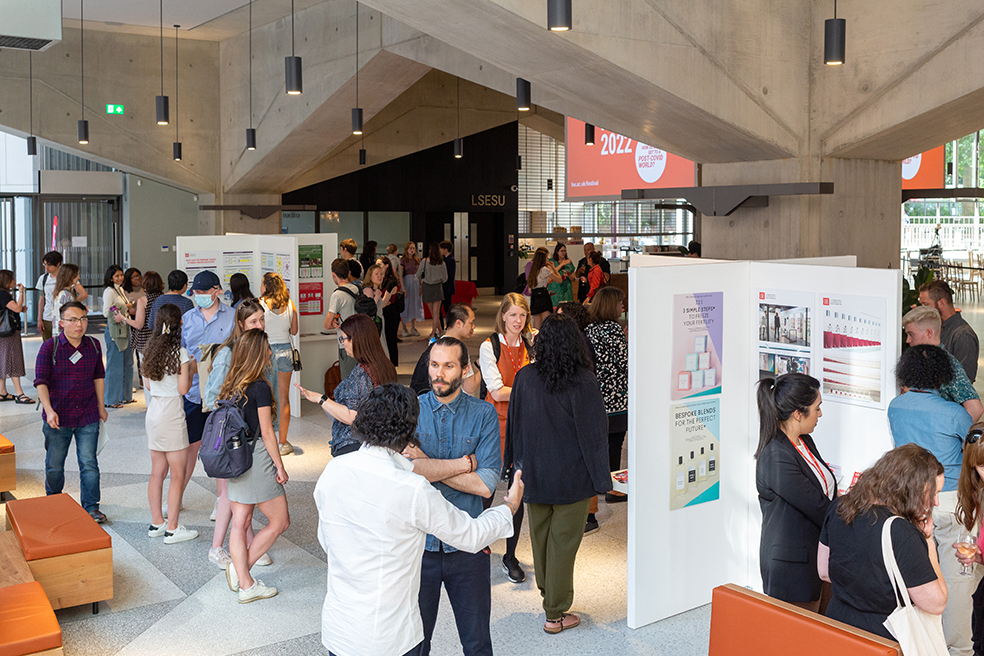
Figure 5 Research Showcase event, LSE Festival 2022.

Figure 6: "Sunbeams: valuing children and their voices" event, LSE Festival 2022.

Figure 7: "Sunbeams: valuing children and their voices" event, LSE Festival 2022.
LSE’s public lecture programme convenes events around themes or audiences, and supports events organised by departments or research centres, responding flexibly to their engagement goals. LSE annually hosts 200+ events with more than 40,000 attendees and 25 million podcast downloads.
The value of our events programme lies not only in promoting LSE research and expertise, but in the important connections staff build with potential research users. It offers a platform for social science researchers globally, supporting LSE’s ambition to promote the public benefit of the social sciences. An average of 160 non-LSE contributors participate in our events annually. Our extensive blog series (42 blogs with 100,000 articles and 10.7 million views annually) provides a free-of-charge global platform, also hosting hundreds of non-LSE contributors.
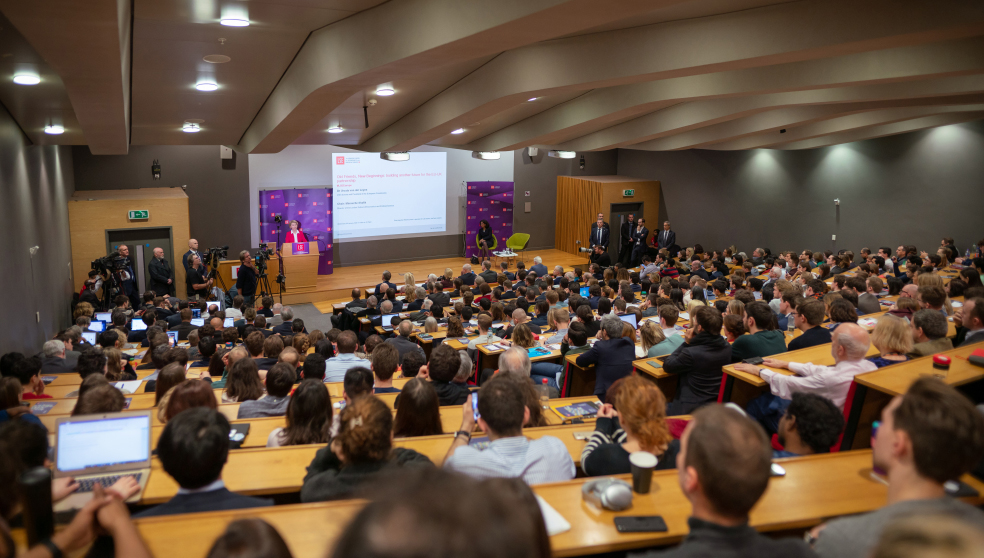
Figure 8: Dr Ursula von der Leyen, President of the European Commission, delivers "Old Friends, New Beginnings: building another future for the EU-UK partnership" lecture at LSE, 8 January 2020.
Other central initiatives include roundtables on key research topics for policymakers and private and public-sector stakeholders, film and podcast series (LSE research videos and LSE IQ), and Research for the World, an online magazine focussing on issue-raising or issue-responding research. Through our social media channels – with nearly two million followers across Facebook, Instagram, LinkedIn, Twitter, TikTok, and YouTube – we engage diverse audiences in conversations about our research.
LSE Leading for London
Our policy engagement team connects LSE research with local and national policymakers through reports, roundtables, private meetings, party conference events, and partnerships with Sense about Science on Evidence Week in Parliament annually. Our Leading for London initiative brings local policymakers and community leaders into conversation with LSE research, engaging over 100 stakeholders (e.g. BusinessLDN, City Hall, London Higher, the APPG for London, London councils) on topics including devolution, post-pandemic recovery, public health, and homelessness. LSE is a founder of the London Research and Policy Partnership, disseminating London-based research amongst the capital’s policymakers.
Research – contributing to the betterment of society for our people and communities
Place-based Climate Action Network
Hosted jointly by LSE, the Edinburgh Centre for Carbon Innovation, Queen's University Belfast, and the University of Leeds, PCAN brings together researchers and decision-makers in the public, private, and third sectors to drive climate action in UK cities and communities. Its innovative climate commissions facilitate two-way, multi-level engagement between researchers and stakeholders. PCAN activities have supported key UK policy objectives and their local implementation, including the city strategies of Belfast, Edinburgh, and Leeds. A CAG Consultants report found the PCAN climate commissions to have been important locally, informing the development of councils’ climate plans (e.g. the Net Zero Carbon Roadmaps), providing a voice for local businesses and employers (e.g. the Edinburgh Climate Compact), engaging with citizens (e.g. Leeds Climate Change Citizen’s Assembly) and youth (e.g. Belfast Climate Youth Survey and Summit), and informing practice on finance and adaptation (e.g. case studies in adaptation finance supporting the Climate Change Committee's report, “Investment for a well-adapted UK”).
Housing Plus Academy
Led by LSE Housing and Communities, in partnership with the National Communities Resource Centre and supported by 14 leading housing associations, Housing Plus Academy promotes change through its participative think tank model, bringing together residents, social housing landlords and staff, researchers, and government officials. Events are action-orientated, use participatory learning techniques, and showcase examples of innovation, best practice, and problem-solving. Participants are diverse, with special efforts made to include ethnic minorities, younger tenants, and smaller associations. Think tanks were suspended during pandemic restrictions but resumed in September 2021, with four events and 114 participants. Evaluations showed 90% of respondents gained practical ideas to improve their housing management or increased understanding of the topics discussed. Reports detailing learning and outcomes from all events, including recommendations for social landlords and other key stakeholders, are publicly available.
Award-winning projects
The excellence of LSE’s P&CE has been externally recognised: Professor Alpa Shah's project challenging inequality and countering oppression in India won a 2022 ERC Public Engagement with Research Award in the "Influence - media and policy" category; an Electoral Psychology Observatory project delivering improved electoral experiences for underrepresented citizens won the ESRC’s 2022 Outstanding International Impact prize; and judges of the Times Higher Education Awards recognised LSE Generate's extensive programme of community support and engagement in the citation to LSE’s Outstanding Entrepreneurial University award.
Education – developing LSE for everyone and educating for impact
Student-led engagement
The Public Research Partners programme has facilitated undergraduate placements at organisations such as environmental charity, Hope For The Future, and think tank, Autonomy, and forms the centrepiece of the civic engagement strand of LSE Student Futures. Both organisational partners and 62 participating students have attested to the two-way value of the programme. The Accelerating Business Collaborations programme (now LSE SPRING) facilitated doctoral student collaborations with more than 30 private-sector organisations, with participating businesses reporting the value of establishing connections with highly skilled individuals who become candidates for new jobs or freelance work. LSE Widening Participation's Pathways to Law and Pathways to Banking and Finance programmes, collaborations with the Sutton Trust, have engaged more than 800 schoolchildren since 2019, providing LSE researcher-led taster sessions and insights into professional careers in these fields.
Aspect 4: Enhancing practice
The breadth and depth of engagement activities undertaken at LSE mean various evaluation methods are used to assess impacts and success and inform future activity. Many are coordinated centrally, while specialist evaluation support is available across the School, particularly within our research centres (e.g. the What Works Centre for Local Economic Growth, the International Growth Centre, the Centre for Analysis of Social Exclusion). Independent evaluations of some larger programmes are also commissioned (e.g. the 2020 evaluation of Global Kids Online, undertaken by Matter of Focus).
Attendances are monitored at LSE events, with feedback sought through regular surveys and via social media. A ticketing system captures audience demographic data and podcast downloads. The programme is overseen by an Events Board, comprising key LSE stakeholders and chaired by the Deputy COO.
The LSE Festival is overseen by a steering group, chaired by the VP&PVCR, to ensure objectives are met. Alongside collected data, survey feedback provides insights on what audiences have learnt from events, whether formats made information accessible, and suggestions for future activity, all of which shape subsequent programmes. In 2020, 95% of respondents felt inspired by the Festival and 86% gained a better understanding of LSE research.
Web analytics track engagement with social media and website content, allowing us to design effective campaigns and provide advice and training on how to effectively use digital media. Our audiovisual team track engagement with their content both quantitatively (through analytics) and qualitatively.
We commission Savanta to poll political stakeholders, their understanding of what LSE does, and what they’d like us to do, most recently in 2022. The Communications Division works to meet KPIs for all research content including reach and engagement goals, tracked through Google Analytics dashboards, surveys, and social listening tools.
SMART objectives and indicators of success for P&CE activities supported by the KEI Fund are developed at application stage. Applicants must identify how their project aligns with the LSE 2030 strategy. Progress reports are submitted midway, to review objectives and reflect on what has (or hasn’t) worked and on any modifications based on feedback from partners, participants, or beneficiaries; and post-project, to review achievements and the extent to which objectives were met. Grant-holders document unexpected outcomes and share advice for others undertaking engagement projects. We use successful projects as case studies to inspire other researchers, whilst taking on board lessons learned where engagement objectives weren’t met.
Evaluation also forms a key part of our training for researchers undertaking KEI.
Aspect 5: Building on success
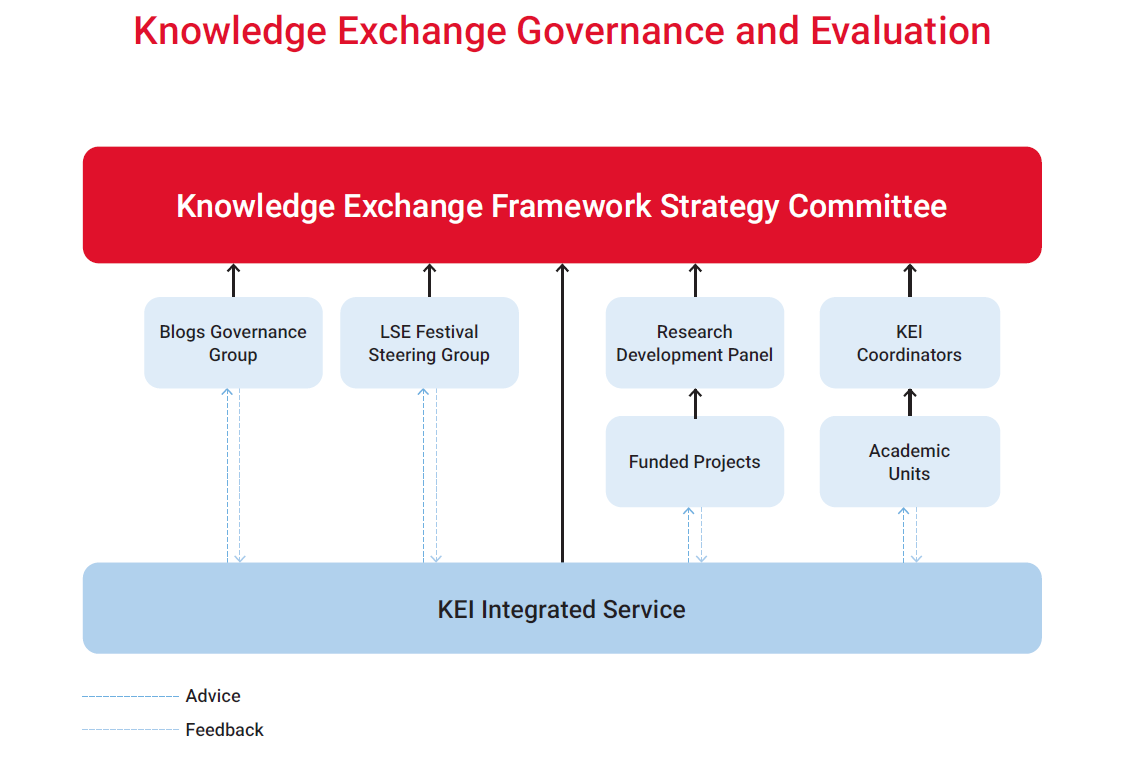
Figure 9: LSE knowledge exchange governance and evaluation.
KEFSC has oversight of all P&CE activities (see Figure 9). It reviews project evaluations (including those mentioned in Aspect 4) to ensure engagement activities meet strategic objectives. The KEI Integrated Service plays a central role in the evaluation of P&CE activities. It is led by LSE's Head of Research Communication and Engagement, a graduate of the NCCPE Engage Academy, who institutes lessons from that programme in fostering a culture of continuous improvement. KEFSC commissions evaluations of significant engagement activities. For example, in 2021 an external consultancy reviewed the operation of LSE’s blogs platform, with recommendations subsequently implemented including recruitment of a dedicated blogs manager and development of a platform strategy.
Through LSE 2030, we have undertaken extensive insight work, including stakeholder mapping and channel reviews to assess our strategic approach. KPIs were subsequently developed for specific activities and outputs detailed in Aspect 4, and our overall approach, including EDI considerations. We have undertaken analysis of the local and regional impacts of our research, identifying strengths and weaknesses of our engagement. Consequently, we have established a civic engagement function and a central strategic support function with a focus on evaluation to inform investment. An additional LSE 2030 workstream, alongside our KE Concordat commitments, involved broad consultation on how best to support and incentivise engagement and develop new strategic partnerships. These strategic enhancements to our engagement activities will be fully resourced and operationalised from autumn 2023.
Summary reports on engagement activities are regularly shared with the LSE President and LSE Council, with highlights appearing in our annual accounts. The presence of public and community representatives on our research centres' advisory boards ensures a valuable level of external oversight of strategy and activities. Our developing civic engagement function will also involve communities in activity planning.
Note You are currently viewing the latest version of this narrative statement. View the previous version as published in previous iterations of the KEF (KEF1 and KEF2)